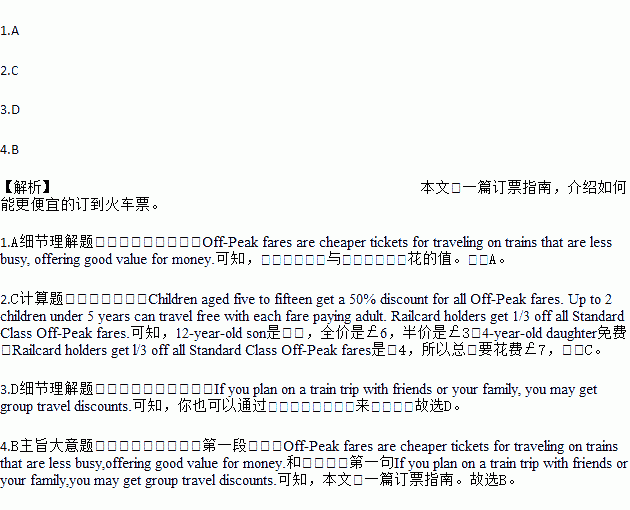题目内容
Off-Peak fares are cheaper tickets for traveling on trains that are less busy, offering good value for money. The tickets may require you to travel at specific times of day, days of the week or on a specific route. Where there is more than one Off-Peak fare for a journey, the cheaper fare is called Super Off-Peak.
You can buy Off-Peak tickets any time before you travel, either online or at a local station. The travel restrictions for your Off-Peak ticket will depend on the journey you are making. The tickets must be used on the date shown on the ticket. For Off-Peak return tickets, related journeys must be made on the date shown on your ticket as well.
Children aged five to fifteen get a 50% discount for all Off-Peak fares. Up to 2 children under 5 years can travel free with each fare paying adult. Railcard holders get l/3 off all Standard Class Off-Peak fares. Senior, and disabled Railcard holders also get l/3 off all First Class Off Peak fares. Please note that minimum fares and time restrictions may apply to tickets bought with a Railcard.
If you plan on a train trip with friends or your family, you may get group travel discounts. Three or four can travel for the price of just two adults-leaving everyone more money to spend on the day out! If you are traveling in a group of ten or more at Off-Peak times, you may be able to obtain a further discount through the train company you are traveling with. Contact the train company directly and be aware that you may need to book tickets in advance.
For more information, please visit www.nationalrail.co.uk.
1.An Off-Peak ticket differs from other tickets in .
A. its good value for money B. its convenience
C. the specific trains D. travel schedules
2.Sarah, a Railcard holder, is traveling with her 12-year-old son and 4-year-old daughter. How much should they pay for the 6-pound Off-Peak fares?
A. £6. B. £18.
C. £7. D. £12.
3.Apart from the Off-Peak fairs, you may also save money by .
A. becoming a VIP B. traveling at rush time
C. buying tickets online D. getting group travel discounts
4.What type of writing is this text?
A. An announcement. B. A ticket booking guide.
C. A business report. D. A travel review.
 阅读快车系列答案
阅读快车系列答案
